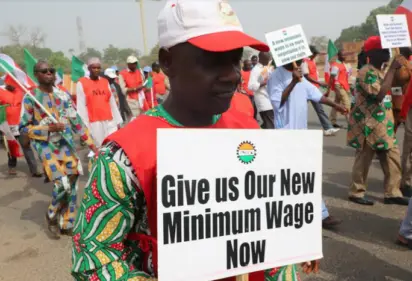The organised private sector has accepted the Federal Government’s proposal for a new minimum wage of N60,000 in the country.
Director General of the Manufacturing Association of Nigeria (MAN), Segun Ajayi-Kadri, disclosed this during an interview with Channels Television on Saturday, June 1.
He noted that ongoing negotiations between the government, the private sector and organised labour were focused on establishing a minimum wage rather than a living wage which represents the lowest amount that can be paid to any worker in the country.
Ajayi-Kadir maintained that both labour and private businesses have been facing significant economic challenges, making it extremely difficult for them to meet the wage demands put forward by labour unions.
He stated: “To start with, this is a very difficult time for anyone to negotiate minimum wage. From the perspective of government, labour and organized private sector, we operate in an environment where there is general acceptance of the fact that the macroeconomics are not right, even the global economy is experiencing a lot of shakeups and the aftermath of government necessary reforms.
“From the beginning of the negotiations of the minimum wage, it’s evident to the tripartite – that is the government, labour, and organized private sector – which we are going to operate in a difficult terrain.
“Incidentally, the organized private sector and government have offered N60,000 as the minimum wage and I think it is very important for us to understand that what we are talking about is the minimum wage. That is what some people have called the walk-in wage. That is the amount we will pay the least workers in the country. It is the minimum wage we are negotiating, not a living wage.”
He further disclosed that both the government and the private sector face significant constraints in fulfilling the proposed N419,000 living wage request, noting that the private sector, for example, is dealing with economic challenges and inflation, making it impossible to pay such an amount.
He also explained that this is not the most appropriate time for organized labour to negotiate a new minimum wage. Instead, they should collaborate with other stakeholders to strengthen the economy.
“All of us in the tripartite— the government, the labour, and the private sector — we all knew that we were operating in a very difficult environment. The government itself realized that it had limited capacity to pay. The private sector is constrained by microeconomic, infrastructure and security challenges. So, we are also constrained to pay.
“Labour on its part, is under intense pressure from its constituencies to ask for a higher wage because inflation has hit the roof and the operating environment is tough.
“Throughout the negotiation process, we made it known that this is not the best time to negotiate minimum wage. This is the time for us to agree, queue behind the government, and grow the economy in such that we will bake a bigger cake and then we’ll be able to share,” Ajayi-Kadir added.
He appealed to the organised labour to reconsider its decision to embark on a nationwide strike, adding that the labour walking out of discussions and declaring strike would not help matters.
He added that it is unfortunate that labour rejected the N60,000 offer from the government and the organised private sector, choosing to declare a nationwide strike.
“We cannot afford to cripple the economy when all we needed to do was continue to build it. I think President Tinubu was very clear when he emerged as president that these are not going to be easy times and I think we needed to tighten our belts to deliver on economy that we know has been seriously battered.
“Of course, the government on its own side has to demonstrate leadership, sensitivity and sense of mind as well as the sense of occasion of the period that we are in. So, government expenditure, government choices of what needs to be done, how much to be spent, the cost of governance itself, all of it has to come to the table.
“I think what labour is actually worried about is that they appear to be the ones on the brunt of it but we needed to be able to engage, walking out on the process and declaring strike, I do not think that that is what is going to solve this issue,” he added.
